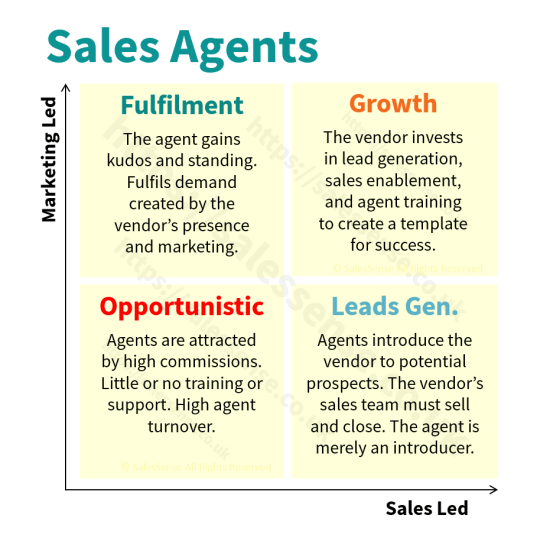Do you get referrals from agents, affiliates or business partners?

Many businesses sell through indirect channels such as resellers, dealers, and distributors. Agents and affiliates are sometimes included under this banner. Agent referrals are different in that the agent doesn't make the sale, only an introduction. Affiliates are similar. Typically an affiliate agreement is less formal and has a smaller financial incentive.
Agents and affiliates are rarely proactive sellers. Their involvement is often a side hustle. The attraction is usually because of special or privileged access to likely buyers because of their circumstances or other activities.
To get more agent and affiliate referrals, pay more attention to them.
By far the best way of ensuring that an agent or affiliate is thinking about what you sell is through agreement and shared plans.
Just dangling a large commission is not sufficient. It is necessary to empower them to sell and to establish what they plan to do to promote your products and services.
If you want agent referrals, make it a specific part of the partnership agreement and then collaborate on a plan for making it happen.
Agent and affiliate agreements usually lack specifics about what will be done because vendors are wooing agents. Agents make bold claims because they are wooing vendors. Both parties make unrealistic promises.
So, once the honeymoon is over, get around the table and establish a joint plan that both parties sign in blood.
There has to be a specific, measurable, actionable, realistic and time-bound plan that the vendor and agent are accountable for.
Things seldom turn out as you plan, yet planning is indispensable.
I wrote the Sales Success Formula to provide a framework for vendors and agents. See it here.
Step-by-Step Guide to Setting Up an Agent Referrals Programme:
Setting up an agent referral program involves creating a structured system where agents (individuals or businesses that refer new clients or customers) are incentivised to recommend your company’s products or services. Here’s a step-by-step guide to setting up an effective agent referral program:
1. Define Your Objectives
Identify Goals: Determine what you aim to achieve with your agent referral program, such as increasing sales, expanding your customer base, or enhancing brand awareness. Make your objectives specific, measurable, and time-bound.
Target Audience: Identify the types of clients or customers you want to acquire through agent referrals. Create a profile that you can share with potential agents.
2. Design the Program Structure
Eligibility Criteria: Define who can be an agent. This could be existing customers, suppliers, business partners, anyone with a relevant network, or people qualified to speak on the subject.
Incentives and Rewards: Decide on the incentives for successful referrals. These can include monetary rewards, discounts, free products/services, and promotions.
Referral Process: Detail how the referral process will work, from submission to reward distribution.
3. Create Program Guidelines
Clear Rules: Develop clear and concise rules and guidelines explaining the referral process, eligibility, incentives, and terms and conditions. Leave nothing open to interpretation, lest it will be misinterpreted.
Documentation: Prepare referral forms or online submission systems for agents to submit referrals easily. Include a referral link system so agents can share links to your website that are uniquely associated with each agent.
4. Develop Marketing and Communication Materials
Promotional Materials: Identify or create documents, emails, and guides to inform potential agents about the program.
Marketing Materials: Identify or create promotional materials for agents to share with their contacts and clients.
Training: Design training sessions or informational resources to help agents find, influence, and refer clients. See the Sales Success Formula.
5. Implement an Agent Referrals Tracking System
Tracking Referrals: Set up a system to track referrals from submission to conversion. This could be a CRM system, a dedicated referral platform, or a simple spreadsheet. Ensure that it tracks visits originating from affiliate links.
6. Launch the Program
Soft Launch: Consider a soft launch to test the program with a small group of agents before a full rollout.
Full Launch: Once the system is tested, launch the program to a broader audience.
Monitor Performance: Regularly review the performance of the referral program, including the number of referrals, conversion rates, and the effectiveness of incentives.
7. Promote the Program
Internal Promotion: Inform your employees and existing network about the referral program.
External Promotion: Use various marketing channels such as social media, email campaigns, and your website to promote the program to potential agents.
8. Manage and Optimise the Program
Regular Communication: Keep agents informed with regular updates, success stories, and reminders about the program.
Feedback Loop: Collect feedback from agents to identify areas for improvement.
Performance Analysis: Analyze the program’s performance regularly and make necessary adjustments to improve its effectiveness.
This is the seventh of 17 referral prospecting methods shared on this site. See the others here.
If you want to set up an agent referrals programme, we can help. Call +44 (0)1392 851500. Alternatively, use the contact form here or send an email to jimm@salessense.co.uk.












